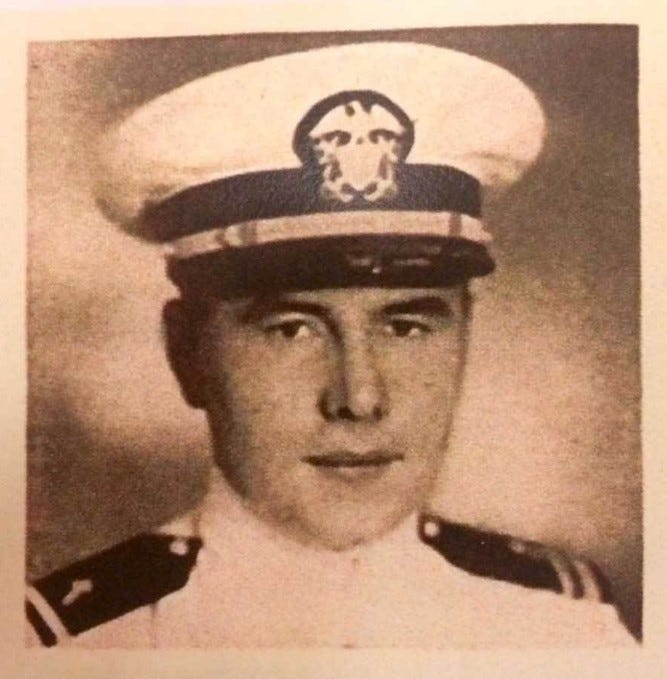TDIH: Thomas Conway, Navy Cross
"He was a priest, it was true, but he was a priest with grit.”
On this day in 2021, a Navy chaplain posthumously receives a Navy Cross. The honor came more than 75 years after Rev. Thomas Conway’s World War II action, and many considered it long overdue.
Conway’s bravery had occurred in the final weeks of the war as he served aboard USS Indianapolis.
That Navy cruiser, you may recall, completed an important task during the summer of 1945: She safely carried parts for the Little Boy atomic bomb across the Pacific. Unfortunately, Indianapolis suffered tragedy a few days later. A Japanese submarine appeared out of nowhere, firing on the ship just after midnight on July 30. Indianapolis sank in a shocking 12 minutes.
About 900 men survived the initial explosions. Lt. Conway was among these.
The chaplain was already much loved by his men. He was known for his kindness and his bold bravery in the face of difficulty. “Once, while saying Mass,” historian Doug Stanton relates, “battle stations had been called suddenly, and the astute Father shouted out, ‘Bless us all, boys! And give them hell!’ The boys loved him for this. He was a priest, it was true, but he was a priest with grit.”
That grit would serve Conway well as Indianapolis went down. Men were floundering in the dark ocean waters, struggling to survive. Conway called out, urging men to swim towards him. Soon, a few dozen had found him. “Conway took time to talk to each of them in turn,” historians Lynn Vincent and Sara Vladic describe, “hear their confessions, and give them last rites.” One survivor later said that he felt a “tremendous peace” in those moments.
Yet the ordeal was just beginning. In the end, Indianapolis’s survivors would spend days in the water. Many were covered with oil. Some were wounded. All faced the constant threat of dehydration-induced delirium—and shark attacks.
Conway remained a constant, calming presence. He swam from lifeboat to lifeboat in the shark-infested waters, encouraging men, rendering aid, and organizing group prayers. He found men who had drifted too far away and brought them back to the others.
The Chief Medical Officer, Dr. Haynes, couldn’t believe what he was witnessing.
“The chaplain, a priest, is not a strong man physically,” he later wrote, “yet his courage and goodness seem to have no limit. I wonder about him, for the night is particularly difficult and most of us suffer from chills, fever and delirium.”
Conway kept this up for three days.
“Father Conway was in every way a messenger of our Lord,” survivor Frank J. Centazzo said. He found Conway “successful in his mission to provide spiritual strength to all of us. He made us believe that we would be rescued. He gave us hope and the will to endure.”
Indeed, Conway was later credited for his part in keeping 67 of his shipmates alive until rescue came. Unfortunately, Conway himself would not make it. Early on August 2, mere hours before the survivors were located, Conway lost his physical battle.
Afterwards, many felt that Conway should be given a Navy Cross, but there was a big problem: Regulations dictated that a senior officer who served with Conway must sign the request. Those officers were no longer alive.
A Navy Cross would finally be awarded, but not until January 2021. Many felt that an old injustice had finally been corrected.
“I choke up thinking about Father Conway swimming from man to man in the ocean,” the nephew of one survivor concluded, “comforting them, praying with them, encouraging them. He focused on others, not on himself, until he died.”
Sources can always be found on my website, here.





Conway obviously took joy in serving, in rallying his flock. He will live in that memory and his reward is great, not just in a man-made medal, but in his relationship with his God.
His story reminds me of the gospel of Matthew, when the disciples were in a boat on the sea being tossed around in a storm. And Jesus walked on water towards them and calmed the storm. This priest was the soldier's spiritual savior at that moment. The Navy Cross was definitely due him...but he is enjoying his real reward in heaven. Jesus calls each of us to do his work...to be there for each other when we face a storm. And the priest was literally doing God's work. Thanks Tara...beautiful story.